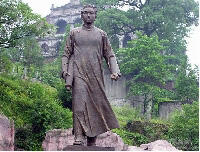How do we explain the unexpected longevity of the Chinese Communist political system? One answer, Elizabeth Perry suggests, lies in the Chinese Communists’ creative development and deployment of cultural resources – during their revolutionary rise to power and afterwards. Skillful “cultural positioning” and “cultural patronage,” on the part of Mao Zedong, his comrades and successors, helped construct a polity in which a once alien Communist system came to be accepted as essentially “Chinese.” Perry traces this process through a case study of the Anyuan coal mine, a place where Mao and other early leaders of the Chinese Communist Party mobilized an influential labor movement at the beginning of their revolution, and whose history later became a contested touchstone of “political correctness” in the People’s Republic of China.
Speaker/Performer: Elizabeth Perry, Government, Harvard University

